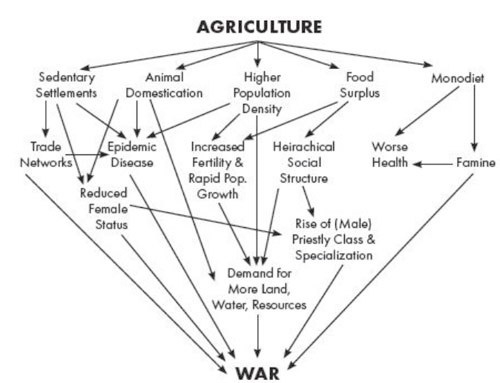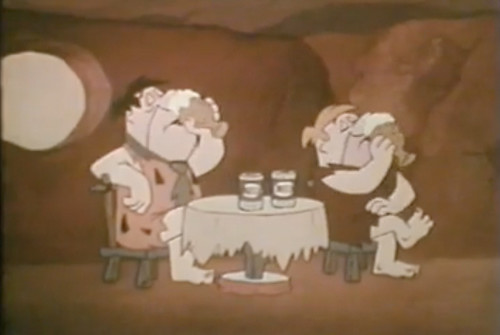![]()
Gizmodo has an intriguing post up right now, combining ideas from two books about early man and the dawn of civilization, Sex at Dawn: The Prehistoric Origins of Modern Sexuality and Uncorking the Past: The Quest for Wine, Beer, and Other Alcoholic Beverages. In Orgies or Beer? You Only Get One, author Joel Johnson speculates that early man eschewed group sex with multiple partners to settle down and make beer, setting us on the path to modern civilization, monogamy and the happy hour. As long as you don’t take it too seriously, it’s a pretty funny idea. (In other words, you can safely ignore the many outraged commenters who seem to have confused Gizmodo with an academic journal, they’re an entirely different kind of funny.)
As Patrick McGovern makes the case in Uncorking the Past, a growing body of evidence is pointing to alcohol — and most likely beer, or a rudimentary form of it, at least — as the reason early nomadic man settled down, in order to grow the crops to insure a steady supply of it. In other words, beer, rather than bread, may have been responsible for civilization as we know it today, with all its good and bad developments and legacies. In the newer book, Sex at Dawn, authors Christopher Ryan and Cacilda Jethá argue that what we gave up for civilization, agriculture and beer was free love, group sex and orgies. Gizmodo summarizes the book’s claims in chart form.

One thing that’s funny about the chart is that everything leads to war, and the most hate-filled comment that I ever received was from someone calling himself “The Savagist” who took that same view to ridiculous heights. He vehemently believed that beer and alcohol were directly responsible for every bad thing that ever happened in the history of mankind, ignoring anything good that civilization also brought. Given his epithet, one might have reasonably presumed he had or wanted to return to that savage “pre-civilized” time, but he was obviously still living in a building, with electricity, and typing on a computer connected to the internet, with no sense of irony. Apparently, when he looked in Pandora’s Box, there was no hope at all after beer released all the evil into the world. Me, I found hope … and hops.
But back to Sex at Dawn, and the key points, as laid down in the Gizmodo article:
- Before humans settled down into civilization, we were small bands of hunter-gatherers who had no notion of sexual monogamy. Within our relatively small tribes, most humans had multiple partners, primarily from within the tribal group, although occasionally we’d have a dalliance with a stranger to keep the DNA pool zesty. Children had multiple social “fathers,” jealousy was nearly nonexistent, and relatively easy access to calories kept us fit, happy, and satisfied well into our 70s and 80s—provided we managed to get past the perils of high mortality rates expected from a wild environment and primitive medicine.
- Upon the discovery of agriculture, nomadic wandering was no longer possible—someone has to stick around to water the crops—so the ideas of property and inheritance became sadly useful. Domesticated food could become scarce, unlike the effectively endless bounty of hunter-gathering (ignoring the occasional climate-torqued famine or run of bad luck), so hoarding became necessary to ensure calories even in lean times. It’s a lot of work to farm, so it became important to ensure that you weren’t wasting your precious grains on someone else’s offspring, especially if it meant you own kid was getting short shrift. Hence monogamy, marriage, and the unfortunate concept of partners as property, manifested in agrarian societies as a tendency to view women as chattel.
- Our genes, still tuned toward sexual novelty, cause us to really hate being monogamous, but societal pressures—including centralized codified religion—force men and women into an arrangement that brings with it just as many problems as it solves. Men cheat, women wither in sexual shackles (or, you know, cheat), wars erupt over resources or sexual exclusivity, cats and dogs almost start sleeping together except they’re afraid the neighbors might find out—Old Testament, real wrath of God-type stuff.
But accidental alcohol was around for probably millions of years and the “drunken monkey hypothesis” proposed by biologist Robert Dudley “attempts to explain why our bodies have evolved such a happy capacity for metabolizing ethanol.” McGovern extends that idea in Uncorking the Past.
On average, both abstainers and bingers have shorter, harsher lives. The human liver is specially equipped to metabolize alcohol, with about 10 percent of its enzyme machinery, including alcohol dehydrogenase, devoted to generating energy from alcohol. Our organs of smell can pick up wafting alcoholic aromas, and our other senses detect the myriad compounds that permeate ripe fruit.
A couple of years ago, this came up in a different context, in a post I wrote entitled Beer and Civilization which discussed a book by Steven Johnson entitled The Ghost Map: The Story of London’s Most Terrifying Epidemic — and How It Changed Science, Cities, and the Modern World. In Johnson’s book, he discusses how at the dawn of civilization, survival often depended on how a person’s body reacted to and could tolerate the beer that was generally safer to drink than water. Over time, only people who were genetically predisposed with the ability to drink large quantities of beer survived, passing that trait down to their children so that perhaps today most of us have such an ancestor as evidenced simply by the fact that we’re here. As [George] Will (and Johnson) explains.
The gene pools of human settlements became progressively dominated by the survivors — by those genetically disposed to, well, drink beer. “Most of the world’s population today,” Johnson writes, “is made up of descendants of those early beer drinkers, and we have largely inherited their genetic tolerance for alcohol.”
But sitting here in my pajamas, typing on my laptop, beer in hand, surrounded by the trappings of modern society, I can’t help but think we made the right choice. I know the world has many, many challenges and problems but would any of us be happier crawling around the Savannah in a loincloth hunting (and gathering) for our next meal — and without a beer to pair with it? Beer may have been responsible for the single greatest butterfly effect in our civilization’s history because it’s nearly impossible to say what life might be like had we not taken the path we’re on. Did we give up orgies for our beer and civilization? Who knows, but I still think we chose wisely.
Another funny and very interesting excerpt from Sex at Dawn is The Flintstonization of Prehistory in which modern morals and values are super-imposed on to the past.


Great article!
Thanks for spreading the word so well.
Warmest Regards,
Finest Beers,
Deepest Thanks,
Samuel Merritt
President, Civilization of Beer
Certified Cicerone TM.